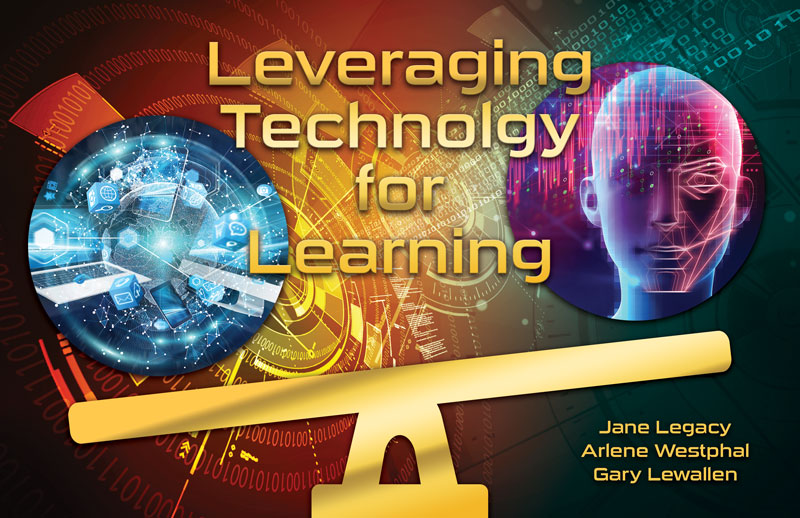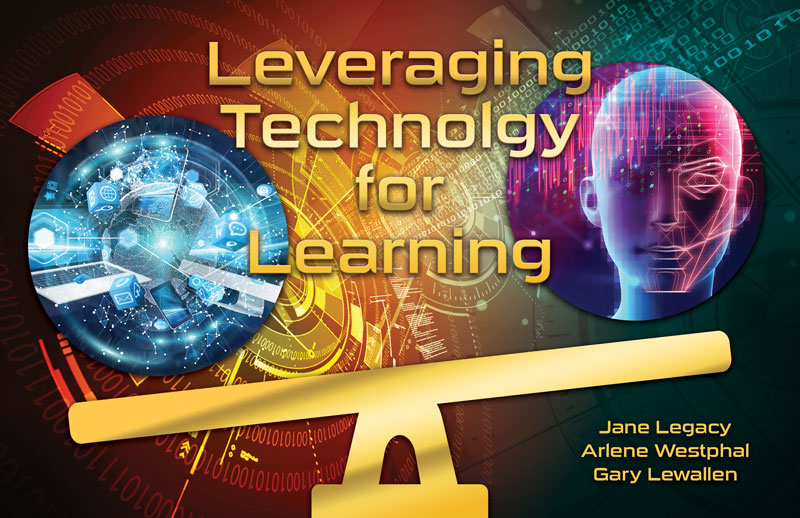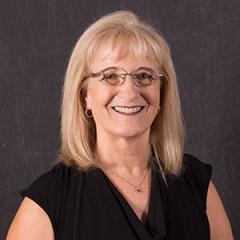Leveraging Technology for Learning
Author(s): Jane Legacy , Arlene Westphal , Gary Lewallen
Edition: 1
Copyright: 2018
Twenty-first century workplace skill requirements include the critical thinking involved in learning relevant software for a particular field, and knowing the best technology to use for given situations.
Leveraging Technology for Learning helps students develop a deeper understanding of computer literacy, mobile technology, and problem-solving using digital technology.
Rather than illustrating how a computer is used to draft a letter or pie chart, Leveraging Technology for Learning provides a more holistic understanding of how computers can make lives easier and more efficient in a variety of ways.
Readers of the online course content, no matter their level of technology skills and awareness, will garner additional knowledge and skills related to being a more critical consumer of computer and mobile technology and software, and work toward expanding their individual horizons in these areas.
The turn-key, customizable course package contains 12 learning modules that each feature:
- Learning activities
- Project
- Knowledge check
- Research
- Presentation
- Readings/videos/screencasts
- Discussion forums
Topic 1: 21st Century Workplace Skills
Topic 2: Course Signature Assignment – Building a Website
Topic 3: Technology. Literacy, and Safety
Topic 4: Legal Issues
Topic 5: Design Principles
Topic 6: Social Media
Topic 7: Web 2.0 Tools
Topic 8: Digital Graphics
Topic 9: Google G Suite (Apps) > Google Drive
Topic 10: Video Production
Topic 11: Emerging Technologies / Personalized Learning
Topic 12: Microsoft Office Applications
Jane M. Legacy's grant/research for the last 16 years has evolved around leadership, change, and technology infusion. This includes the impact of "Integration of Technology into the Curriculum" on student achievement and "attitude, anytime, anywhere e-Learning", national student and teacher technology standards for the United States, online education, K-12 preservice professional development in online teaching, instructional design, universal design and design thinking. Her online focus is based on quality matters research and evaluations for online environments.
Legacy is interested in examining the attrition and retention of students in a technology-based courses using a new course design model, "Labryd". Legacy's face to face instructional strategy research is now focused on a new model of "Labryd" design for the face to face classroom to explore the "Labryd" design pilot viability as an option for student and teacher learning experience in the future. This new "Labryd" design combines flipped classroom strategies, personal learning and project based management couple with the 21st-century skills (critical thinking, creativity, decision making).
Arlene is a proud alum who earned a M.Ed. in Educational Technology from the Mary Lou Fulton Teachers College and a B.S. degree in Educational Media from Florida Atlantic University. She has worked as a teacher/librarian and media specialist in the elementary and secondary levels of public education. She taught information literacy and content literacy to students, and conducted professional development for teachers, in the areas of instructional design, integrating technology, and content literacy. In her “teacher on assignment” role at Tempe Union High School District, Arlene supervised curriculum mapping and instructional design for English and social studies departments at each of the high schools.
Arlene worked at the AZ Department of Education where she led distance learning and online instructional design initiatives to support state-wide professional development. She continued her career focus on distance learning and online instructional design at a private law school in Downtown Phoenix, where she collaborated on writing strategic plans and project charters to roll-out distance learning initiatives, and she provided professional development to faculty on instructional design and emerging educational technologies.
In her former role with ASU Fulton Schools of Engineering - Global Outreach & Extended Education, and College of Health Solutions, Arlene continued in a leadership capacity to support the design and development of engaging and interactive quality online credit and non-credit courses. As a Faculty Associate, she also teaches ASU undergraduate courses in computer literacy and problem-solving using digital technologies, through the Mary Lou Fulton Teachers College.
Teaching and learning and educational technology has been a significant and integral aspect of Arlene’s professional life, and personal life raising five children. She continually studies the field to better understand and apply research-based best practices.
Arlene may be reached at arlene.westphal@asu.edu
Professional Experiences graphic
Twenty-first century workplace skill requirements include the critical thinking involved in learning relevant software for a particular field, and knowing the best technology to use for given situations.
Leveraging Technology for Learning helps students develop a deeper understanding of computer literacy, mobile technology, and problem-solving using digital technology.
Rather than illustrating how a computer is used to draft a letter or pie chart, Leveraging Technology for Learning provides a more holistic understanding of how computers can make lives easier and more efficient in a variety of ways.
Readers of the online course content, no matter their level of technology skills and awareness, will garner additional knowledge and skills related to being a more critical consumer of computer and mobile technology and software, and work toward expanding their individual horizons in these areas.
The turn-key, customizable course package contains 12 learning modules that each feature:
- Learning activities
- Project
- Knowledge check
- Research
- Presentation
- Readings/videos/screencasts
- Discussion forums
Topic 1: 21st Century Workplace Skills
Topic 2: Course Signature Assignment – Building a Website
Topic 3: Technology. Literacy, and Safety
Topic 4: Legal Issues
Topic 5: Design Principles
Topic 6: Social Media
Topic 7: Web 2.0 Tools
Topic 8: Digital Graphics
Topic 9: Google G Suite (Apps) > Google Drive
Topic 10: Video Production
Topic 11: Emerging Technologies / Personalized Learning
Topic 12: Microsoft Office Applications
Jane M. Legacy's grant/research for the last 16 years has evolved around leadership, change, and technology infusion. This includes the impact of "Integration of Technology into the Curriculum" on student achievement and "attitude, anytime, anywhere e-Learning", national student and teacher technology standards for the United States, online education, K-12 preservice professional development in online teaching, instructional design, universal design and design thinking. Her online focus is based on quality matters research and evaluations for online environments.
Legacy is interested in examining the attrition and retention of students in a technology-based courses using a new course design model, "Labryd". Legacy's face to face instructional strategy research is now focused on a new model of "Labryd" design for the face to face classroom to explore the "Labryd" design pilot viability as an option for student and teacher learning experience in the future. This new "Labryd" design combines flipped classroom strategies, personal learning and project based management couple with the 21st-century skills (critical thinking, creativity, decision making).
Arlene is a proud alum who earned a M.Ed. in Educational Technology from the Mary Lou Fulton Teachers College and a B.S. degree in Educational Media from Florida Atlantic University. She has worked as a teacher/librarian and media specialist in the elementary and secondary levels of public education. She taught information literacy and content literacy to students, and conducted professional development for teachers, in the areas of instructional design, integrating technology, and content literacy. In her “teacher on assignment” role at Tempe Union High School District, Arlene supervised curriculum mapping and instructional design for English and social studies departments at each of the high schools.
Arlene worked at the AZ Department of Education where she led distance learning and online instructional design initiatives to support state-wide professional development. She continued her career focus on distance learning and online instructional design at a private law school in Downtown Phoenix, where she collaborated on writing strategic plans and project charters to roll-out distance learning initiatives, and she provided professional development to faculty on instructional design and emerging educational technologies.
In her former role with ASU Fulton Schools of Engineering - Global Outreach & Extended Education, and College of Health Solutions, Arlene continued in a leadership capacity to support the design and development of engaging and interactive quality online credit and non-credit courses. As a Faculty Associate, she also teaches ASU undergraduate courses in computer literacy and problem-solving using digital technologies, through the Mary Lou Fulton Teachers College.
Teaching and learning and educational technology has been a significant and integral aspect of Arlene’s professional life, and personal life raising five children. She continually studies the field to better understand and apply research-based best practices.
Arlene may be reached at arlene.westphal@asu.edu
Professional Experiences graphic




